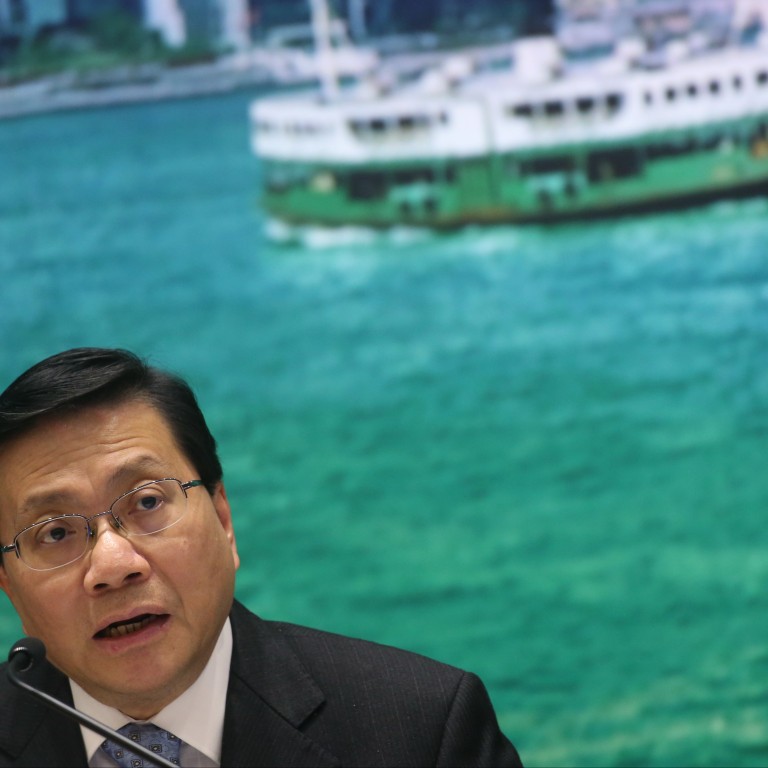
Hong Kong must not build third runway based on vague airspace promises
Albert Cheng says there is no guarantee the mainland will open up its airspace to ensure the success of Hong Kong's airport expansion
The Executive Council's hasty decision last week to approve the third runway has triggered a public outcry. Secretary for Housing and Transport Anthony Cheung Bing-leung has scrambled to justify this most expensive infrastructure project in the history of Hong Kong. However, his limited explanations have led to even more doubts.
The most pertinent questions revolve around the city's airspace entitlements. Flights leaving and approaching Chek Lap Kok are barred from crossing into the airspace immediately north of the border. This has severely restricted the number of planes the airport can handle.
Cheung said Macau and the mainland had signed an agreement with Hong Kong to resolve the issues of congested airspace in the region up to 2020. But he refused to disclose details of the agreement, citing national security.
This is ridiculous. Any consensus among the parties needs to be made known to the airliners and international aviation bodies before they can be put into practice. If Hong Kong was promised any concessions, the industry would need to be informed well beforehand, to prepare for the changes.
None of the third parties have been notified. That can only mean the 2007 plan has nothing concrete for Hong Kong. Cheung's secretive approach has only added to speculation that the agreement contains, at best, vague principles.
Besides, whatever was written into the agreement is only meant to be valid until 2020, well before the third runway becomes operational in the mid-2020s.
There is nothing in black and white that guarantees Hong Kong would be given the necessary air paths to ensure the success of the third runway.
Airport Authority chief executive Fred Lam Tin-fuk said people should trust the Hong Kong and central governments to solve the problem. He is obviously unaware of the latest findings of the Hong Kong University's public opinion programme released this week. Only 37 per cent of the people asked said they trusted the SAR government, while only 33 per cent said they trusted Beijing. Trust is in short supply when it comes to how Hong Kong people see their political masters.
Lam is entrusted with overseeing the statutory body responsible for the operation and development of the airport. Taxpayers would have wanted a more prudent chief executive to first resolve the airspace issue before rushing into a bet of HK$142 billion.
Chief Executive Leung Chun-ying made an even more irrational plea: the public should first support the project, and the technical problems could be solved later, he said. His administration does not have a track record of getting the job done to make his call credible.
Leung's remarks are tantamount to admitting that there is no agreement on the third runway. If mainland bureaucrats are so eager to enhance the facility, they would have done so by now.
Who has been standing in the way? It may have been the Shenzhen airport operator, the Guangdong provincial authority, the Civil Aviation Administration of China, the People's Liberal Army, or other interests. Their agendas are very different from ours. Even if we agreed to take a blind leap of faith with Leung, Hong Kong would still be in a weak negotiating position.
Once construction has started on the runway, the Airport Authority will have passed the point of no return. The Chinese interests are well aware of this.
If airspace problems remain unresolved, the project would become a white elephant and the Airport Authority would face deepening financial liability. Our mainland competitors would be in a good position to demand that Hong Kong give up some of its valuable civil aviation rights in return for access to airspace.
None of our neighbouring Chinese cities can claim to be international aviation hubs. It would be a different story if they could lay claim to part of our rights for bilateral negotiations with other countries. That would spell the end of Hong Kong as a leader in aviation.
It is enshrined in the Basic Law that the Hong Kong government should "take measures for the maintenance of the status of Hong Kong as a centre of international and regional aviation". Yet, in reality, neither the government nor the Airport Authority has any realistic plan to keep Hong Kong ahead of its neighbours.
Instead of relying on an uncertain third runway a decade later, we should take immediate steps. Any stipulations in the 2007 agreement that benefit Hong Kong should be translated into action without delay.
Failing that, we should at least begin to look at other options, such as levelling the hilltop close to Chek Lap Kok, to enable more frequent take-offs. Only such measures can make us less reliant on the mainland and thus in a better position to negotiate.

